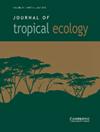Acacia invasion differentially impacts soil properties of two contrasting tropical lowland forests in Brunei Darussalam
IF 1
4区 环境科学与生态学
Q4 ECOLOGY
引用次数: 5
Abstract
Invasive Acacia species are known to modify soil properties, although effects are often site-specific. We examined the impact of Acacia species on the soils of intact and invaded habitats of two contrasting tropical lowland rain forest types in Brunei Darussalam: heath forest (HF) and mixed dipterocarp forest (MDF). Impacts on soil properties differed between the two forest types. Overall, Acacia-invaded HF soil recorded significantly higher gravimetric water content, pH and total P, K and Ca compared to the intact HF soil. In contrast, invaded MDF soil exhibited significantly higher organic matter content and total soil N, P, K and Mg compared to its intact habitat. Acacia-invaded MDF soils were more nutrient-enriched than Acacia-invaded HF soils by the addition of threefold, threefold and fourfold total soil P, K and Mg, respectively. The positive effect of addition of total soil Ca was, however, fourfold greater in HF soil than MDF soil, indicating that the magnitude of impact on soil properties was strongly site-specific. Overall, Acacia invasion significantly impacted soil properties in nutrient-rich MDF more than those of nutrient-poor HFs, indicating a potential vulnerability of MDFs to invasion.金合欢入侵对文莱达鲁萨兰国两种不同热带低地森林土壤性质的影响不同
众所周知,入侵的金合欢物种可以改变土壤性质,尽管影响通常是特定地点的。在文莱达鲁萨兰国的两种不同的热带低地雨林类型:石南森林(HF)和混合龙脑林(MDF)中,研究了金合欢物种对完整生境和入侵生境土壤的影响。两种森林类型对土壤性质的影响不同。总体而言,金合欢入侵HF土壤的重量含水量、pH和全磷、全钾、全钙均显著高于完整HF土壤。入侵MDF土壤有机质含量和全氮、全磷、全钾、全镁含量显著高于完整生境。金合欢入侵的MDF土壤比金合欢入侵的HF土壤在添加3倍、3倍和4倍土壤总磷、钾和镁的情况下更富养分。然而,添加全钙对土壤的积极影响在HF土壤中是MDF土壤的四倍,表明对土壤性质的影响程度具有强烈的地点特异性。总体而言,金合欢入侵对富营养区土壤性质的影响大于贫营养区,表明富营养区对入侵具有潜在的脆弱性。
本文章由计算机程序翻译,如有差异,请以英文原文为准。
求助全文
约1分钟内获得全文
求助全文
来源期刊

Journal of Tropical Ecology
环境科学-生态学
CiteScore
2.10
自引率
0.00%
发文量
44
审稿时长
18-36 weeks
期刊介绍:
Journal of Tropical Ecology aims to address topics of general relevance and significance to tropical ecology. This includes sub-disciplines of ecology, such as conservation biology, evolutionary ecology, marine ecology, microbial ecology, molecular ecology, quantitative ecology, etc. Studies in the field of tropical medicine, specifically where it involves ecological surroundings (e.g., zoonotic or vector-borne disease ecology), are also suitable. We also welcome methods papers, provided that the techniques are well-described and are of broad general utility.
Please keep in mind that studies focused on specific geographic regions or on particular taxa will be better suited to more specialist journals. In order to help the editors make their decision, in your cover letter please address the specific hypothesis your study addresses, and how the results will interest the broad field of tropical ecology. While we will consider purely descriptive studies of outstanding general interest, the case for them should be made in the cover letter.
 求助内容:
求助内容: 应助结果提醒方式:
应助结果提醒方式:


